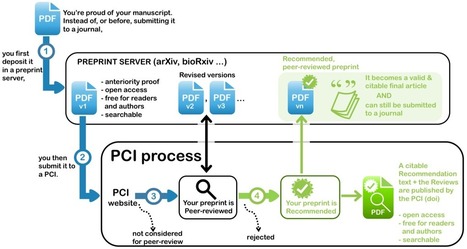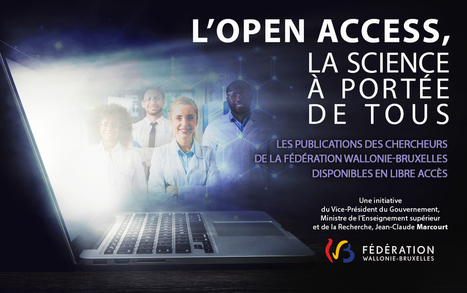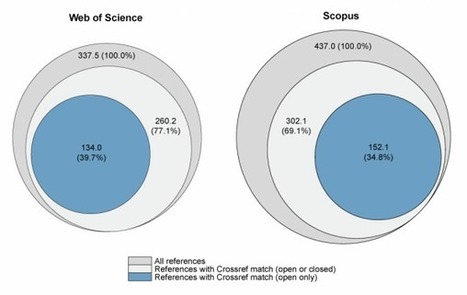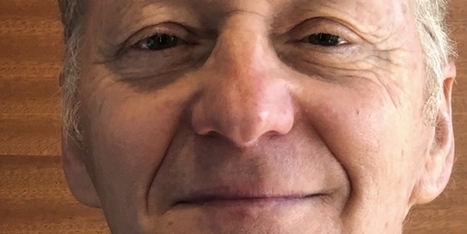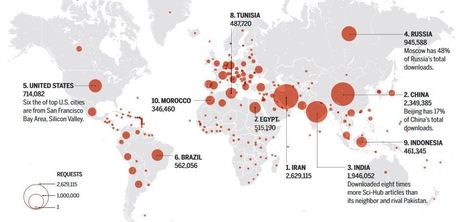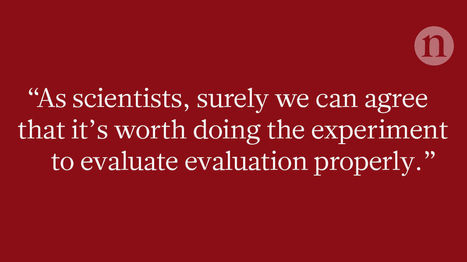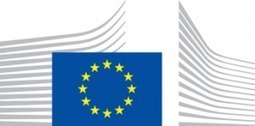 Your new post is loading...
 Your new post is loading...

|
Scooped by
Bernard Rentier
April 17, 2018 11:14 AM
|
Les parlementaires de la Commission #Recherche @ParlementF #FédérationWallonieBruxelles votent à l’unanimité moins une abstention le Décret #OpenAccess : une avancée majeure et historique qui défend l’accès à la science au plus grand nombre pic.twitter.com/6ehjClO4Hs

|
Scooped by
Bernard Rentier
April 12, 2018 4:00 PM
|

|
Scooped by
Bernard Rentier
April 4, 2018 6:00 AM
|
The problems with academia are multifaceted. The intense competition for positions and funding rewards numbers of publications and grant dollars brought in, rather than advances in understanding. Individual researchers cannot change this state of affairs without uniting to improve the system. While many issues need to be addressed, there is one revolution that researchers can…

|
Rescooped by
Bernard Rentier
from Elapsing Time
April 1, 2018 3:17 AM
|
Sur proposition du Ministre de l'enseignement supérieur et de la Recherche, le Gouvernement de la Fédération Wallonie-Bruxelles à adopté, en dernière lecture, le projet de décret « Open Access », un texte fondateur visant l'établissement d'une politique de libre accès aux publications scientifiques.

|
Scooped by
Bernard Rentier
March 29, 2018 2:57 AM
|
In this post, we provide empirical insights into the value of Crossref as a new source of citation data. We compare Crossref with WoS and Scopus, focusing on the citation data that is available in the different data sources. Our analysis will show that more than three-quarters of the references in WoS and more than two-thirds of the Scopus references can be found in Crossref, with about half of these references being openly available. On the other hand, it will also be shown that millions of references are missing in Crossref. These references occur in publications that have been deposited in Crossref without their references.

|
Scooped by
Bernard Rentier
March 16, 2018 12:43 PM
|
Personnellement, c’est pour moi une immense satisfaction, après avoir lancé ce qu’on appelle aujourd’hui mondialement le ‘Liège Model’ de manière essentiellement ‘top-down’, de voir que les chercheurs sont devenus des ‘fans’ convaincus de l’outil, l’utilisent magnifiquement et exhortent tous leurs collègues à l’utiliser. En effet, l’Open Access n’a de sens que si tout le monde le pratique. C’est un acte de générosité et de partage caractéristique des fondements de la Science qui doit être unanime. Une législation claire a pour objectif de rassurer les chercheurs eux-mêmes face aux pressions diverses et aux intimidations commerciales ou hiérarchiques qui s’exercent sur eux, tout en permettant la promotion la plus large de leurs travaux. En outre, cette législation pave le chemin vers des méthodes d’évaluation de la recherche et des chercheurs bien plus justes et plus objectives que les jugements rapides basés sur le prestige et les ouï-dire en usage actuellement.

|
Scooped by
Bernard Rentier
February 26, 2018 11:53 AM
|
This article discusses how the blockchain technology can resolve the problems scientific research and scholarly communication face
Pour contourner le système des revues scientifiques payantes, une équipe de chercheurs met au point une plateforme de publication décentralisée basée sur la blockchain.
Via ist IRD

|
Scooped by
Bernard Rentier
February 6, 2018 12:08 PM
|
The world of scholarly publishing is in upheaval. As the open science and open research movements rapidly gain momentum, the access restrictions and paywalls of many publishers put them at odds wit…

|
Scooped by
Bernard Rentier
January 30, 2018 10:31 AM
|
Open Science describes the on-going transitions in the way research is performed, researchers collaborate, knowledge is shared, and science is organised. It is one of the three strategic priorities announced by the Commissioner for Research, Science and Innovation, Carlos Moedas, in June 2015. The others are Open Innovation, and Openness to the World.

|
Scooped by
Bernard Rentier
January 25, 2018 4:49 AM
|
Conférence conjointe de l’Université de Lausanne et de Wallonie-Bruxelles International

|
Scooped by
Bernard Rentier
January 20, 2018 3:38 PM
|
Enago launches Open Access Journal Finder (OAJF) – Improving accessibility of authentic open access journals

|
Scooped by
Bernard Rentier
January 17, 2018 3:03 PM
|
Science communication has been undergoing a considerable evolution in the Internet era in spite of a strong resistance from both the publishing and the research communities. Open Access (OA) is finally letting researchers, scholars and students, particularly those in developing countries, acquire full access to scientific knowledge. Nowadays however, reluctance by these…
|

|
Scooped by
Bernard Rentier
April 17, 2018 4:56 AM
|
Couperin.org, a consortium of French institutes, estimated that the lack of a contract between them and SpringerNature was causing the publisher a loss of over $6 million

|
Scooped by
Bernard Rentier
April 12, 2018 5:27 AM
|
OA books are, on average, downloaded 7 times more, cited 50% more, and mentioned online 10 times more.

|
Scooped by
Bernard Rentier
April 3, 2018 4:43 AM
|
Open access to scientific publications must be reality by 2020, says Robert-Jan Smits.

|
Scooped by
Bernard Rentier
March 29, 2018 3:45 AM
|
A new federally funded project called Polyplexus aims to become a repository for “micropubs” — 300-character summaries of research findings. For now, it’s open to academic scientists only.

|
Scooped by
Bernard Rentier
March 20, 2018 5:39 AM
|

|
Scooped by
Bernard Rentier
March 4, 2018 4:33 AM
|
par Pierre-Loup Beauregard L’accès limité à la connaissance scientifique peut être un frein au développement de certains domaines, surtout dans les pays en voie de développement. C’est pour combattre ce phénomène qu’en 2011, Alexandra Elbakyan, étudiante en neuroscience et d’origine kazakhe, lance le site Sci-Hub. L’objectif de Sci-Hub est simple: contourner les paywalls protégeant l’accès…

|
Scooped by
Bernard Rentier
February 9, 2018 4:30 AM
|
Five years ago, the Declaration on Research Assessment was a rallying point. It must now become a tool for fair evaluation, urges Stephen Curry.

|
Scooped by
Bernard Rentier
February 9, 2018 12:27 AM
|
Bravo @research_uk: "Research councils consider the journal impact factor and metrics such as the H-index are not appropriate measures for assessing the quality of publications or...researchers, and...will not use [them] in our peer review processes." rcuk.ac.uk/documents/rese…

|
Scooped by
Bernard Rentier
February 3, 2018 6:35 AM
|
Although Finland and South Korea have agreed deals with the publisher, European sectors are looking to take a harder line

|
Scooped by
Bernard Rentier
January 30, 2018 10:25 AM
|
La Bibliothèque Scientifique Numérique privilégie l'accès aux documents et données
scientifiques sous toute ses formes pour le monde universitaire et académique

|
Scooped by
Bernard Rentier
January 22, 2018 3:20 PM
|
Options available to authors to make their work open access are on the rise. Adoption of open access itself is also rising, and usage of open-access materials is similarly increasing. However, alon…

|
Scooped by
Bernard Rentier
January 18, 2018 9:25 AM
|
UCL Press is launching a new open access megajournal that will provide academics and students with ground-breaking research free of charge in a move that challenges traditional commercial publishing models.
|
 Your new post is loading...
Your new post is loading...
 Your new post is loading...
Your new post is loading...






